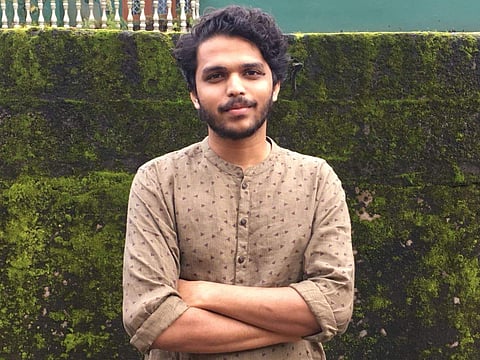

Urdu was always around 23-year-old Khurram Muraad, who is pursuing Masters in Linguistics from University of Hyderabad. During the lockdown last year, a casual meeting with friends from Hyderabad who were interested in the language ensued and Khurram was asked to teach them how to read and write in Urdu. "I had always imagined that if I were to teach any Language it would be English, but the love for Urdu had only grown with time," says Khurram, and once he had held the first few sessions for his friends, he admits teaching Urdu simply became a matter of joy for him. He is currently conducting his fifth such session.
Christening these classes "Easy Urdu Learning" he set out looking for takers on social media, and to his surprise, he learnt that there was no dearth of people looking for an Urdu teacher. Some wanted to learn because they were enamoured by famed Urdu poetry. "For them, Urdu is a beautiful exotic language, and they wanted to learn how to understand, read and write the poetry they have so much love and appreciation for," shares Khurram. There were also those who wanted to learn their mother tongue better. "Urdu is fading from the academic scene in schools. It is either an optional second or third language, if at all," says Khurram who did his primary school education in Urdu.
His students also comprise research scholars from premier universities in the country who are learning the script to better access archives and historical texts. Then there are people who married into the linguistic community and want to learn the language for their partners. A student from Mexico is a case in point. One of his students is a 12-year-old-boy from Chennai who took classes to surprise his mom who used to read him stories in Urdu at bedtime. Interestingly, he has observed that students from the southern states of India have adapted with ease to writing the script. "Since it is written from right to left, a lot of them view it as an art form, or a sketch of sorts," Khurram shares.
"I have had students who had no background in Urdu, but were able to write 200 word essays on their own by the end," says Khurram
His methods of teaching Urdu fall back on the traditional texts and resources. "Modern ways of teaching Urdu employ English as a reference point for non-speakers and design their syllabus. Many Urdu departments in universities devise such methods. But I have always found sticking to the traditional method is much simpler," says Khurram. And so he turns to the 'Bolta Qaeda' which is the classical textbook consisting of a set of rules for learning Urdu. He found one of these with his grandmother, and has been using it as a course book for the sessions. Khurram also adds that referring to Persian and Arabic roots of words is crucial too.
Growing up around shelves filled with Urdu books that belonged to his grandparents, the language comes naturally to Khurram. He, however, has been feeling a sense of erasure over the years. "When I was a child, the names of the platforms on railway stations would be written in four languages — Hindi, Urdu, English and the language of the respective region. However, these day, I sometimes find that the Urdu name has been scratched or painted out or omitted entirely," he shares. Nevertheless, Khurram believes that appreciation for the language has always existed in Indian popular culture, and that isn't about to die any time soon.
